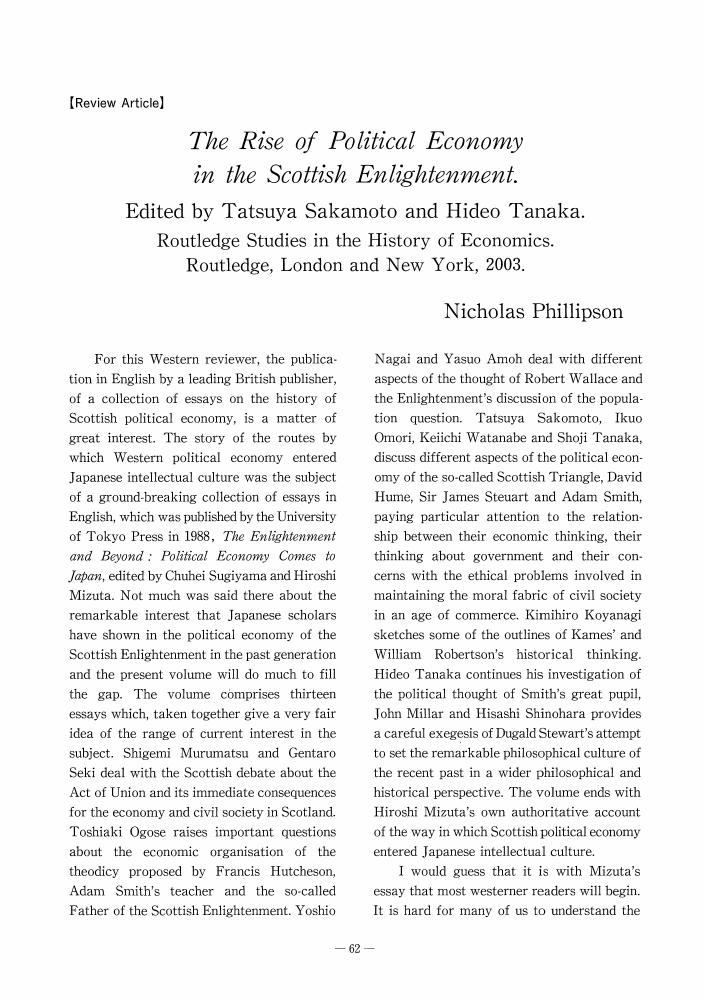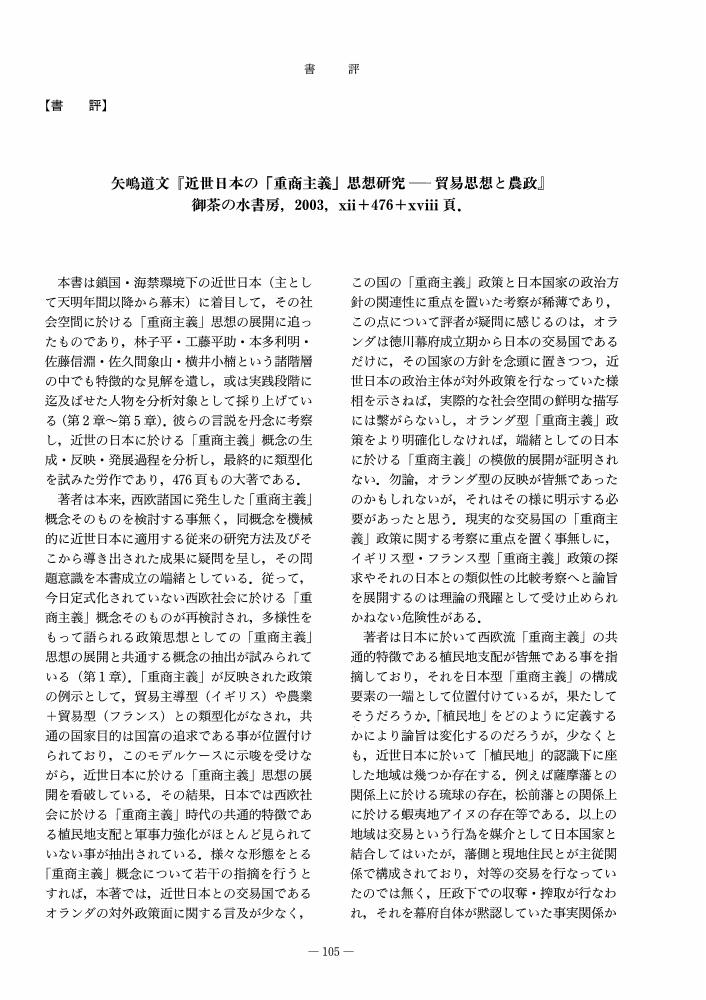1 0 0 0 エンゲルスの理論活動の意義と問題:没後100年を記念して
- 著者
- 保住 敏彦
- 出版者
- 経済学史学会
- 雑誌
- 経済学史学会年報 (ISSN:04534786)
- 巻号頁・発行日
- vol.33, no.33, pp.39-51, 1995
In this paper, I examine the thoretical works of Friedrich Engels in his youth and later years in order to elucidate the significance and limitation of that work. I have investigated the following: <i>Outlines of a Critique of Political Economy</i>, and <i>The Condition of the Working Class in England</i>, which are early works, and <i>Anti-Dühring</i>, a later work. My research indicates that the young Engels moved from Left-Hegelianism to Communism in 1842, earlier than young Marx, and played an important role in formulating the Materialist Conception of History. The paper traces the development of Marx's ideas as contained in the theory of alienated labour in <i>Economic and Philosophical Manuscript</i> (1844) and compares them to those of the Materialist Conception of History in <i>The German Ideology</i> (1846) by Engels and Marx. Finally it examines Engels' book Anti-Dühring (1885) in order to discover the characteristics of his interpretation of Marxian Theories, and finds his interpretation of history evolutionistic and optimistic.
- 著者
- 深貝 保則
- 出版者
- 経済学史学会
- 雑誌
- 経済学史学会年報 (ISSN:04534786)
- 巻号頁・発行日
- vol.35, no.35, pp.171-173, 1997
- 著者
- 田中 敏弘
- 出版者
- 経済学史学会
- 雑誌
- 経済学史学会年報 (ISSN:04534786)
- 巻号頁・発行日
- vol.46, no.46, pp.114-115, 2004 (Released:2010-08-05)
- 著者
- 栗田 啓子
- 出版者
- The Japanese Society for the History of Economic Thought
- 雑誌
- 経済学史学会年報 (ISSN:04534786)
- 巻号頁・発行日
- vol.46, no.46, pp.116-118, 2004 (Released:2010-08-05)
- 著者
- 深貝 保則
- 出版者
- The Japanese Society for the History of Economic Thought
- 雑誌
- 経済学史学会年報 (ISSN:04534786)
- 巻号頁・発行日
- vol.46, no.46, pp.119-121, 2004 (Released:2010-08-05)
- 著者
- 上宮 正一郎
- 出版者
- The Japanese Society for the History of Economic Thought
- 雑誌
- 経済学史学会年報 (ISSN:04534786)
- 巻号頁・発行日
- vol.46, no.46, pp.122-124, 2004 (Released:2010-08-05)
- 著者
- 服部 正治
- 出版者
- The Japanese Society for the History of Economic Thought
- 雑誌
- 経済学史学会年報 (ISSN:04534786)
- 巻号頁・発行日
- vol.46, no.46, pp.125-126, 2004 (Released:2010-08-05)
- 著者
- 小林 純
- 出版者
- The Japanese Society for the History of Economic Thought
- 雑誌
- 経済学史学会年報 (ISSN:04534786)
- 巻号頁・発行日
- vol.46, no.46, pp.127-129, 2004 (Released:2010-08-05)
- 著者
- 廣瀬 弘毅
- 出版者
- The Japanese Society for the History of Economic Thought
- 雑誌
- 経済学史学会年報 (ISSN:04534786)
- 巻号頁・発行日
- vol.46, no.46, pp.130-132, 2004 (Released:2010-08-05)
- 著者
- 西部 忠
- 出版者
- The Japanese Society for the History of Economic Thought
- 雑誌
- 経済学史学会年報 (ISSN:04534786)
- 巻号頁・発行日
- vol.46, no.46, pp.133-135, 2004 (Released:2010-08-05)
- 著者
- 浅田 統一郎
- 出版者
- The Japanese Society for the History of Economic Thought
- 雑誌
- 経済学史学会年報 (ISSN:04534786)
- 巻号頁・発行日
- vol.46, no.46, pp.136-138, 2004 (Released:2010-08-05)
- 著者
- Nicholas Phillipson
- 出版者
- The Japanese Society for the History of Economic Thought
- 雑誌
- 経済学史学会年報 (ISSN:04534786)
- 巻号頁・発行日
- vol.46, no.46, pp.62-66, 2004 (Released:2010-08-05)
1 0 0 0 OA 日本経済思想史: 戦前・戦時期の経済思想
- 著者
- 柳澤 治
- 出版者
- The Japanese Society for the History of Economic Thought
- 雑誌
- 経済学史学会年報 (ISSN:04534786)
- 巻号頁・発行日
- vol.46, no.46, pp.67-82, 2004 (Released:2010-08-05)
- 参考文献数
- 87
This essay aims to survey Japanese studies published in the past twenty years, which have contributed to the investigation of economic views and their theoretical bases in Japan before and during World War II, especially from the outbreak of the world economic crisis in 1929 up to the end of the Pacific War in 1945. During this period, Japanese were confronted with a serious economic depression, social and political unrest, military operations in Mandshrei and war against China, the reinforcement of militarism and totalitarianism in politics, and the second World War. With the beginning of the war against China, Japan shifted to a wartime economy, in which the government endeavored to increase the productive capacity of the munitions industry and to control the national economy. The pursuit of the government for economic control and the establishment of a wartime economy influenced the thinking and the theoretical viewpoints of intellectuals in the field of economics. Many Japanese economists pursued regulation of the economy that would continue to establish a new economic order after the war. The economic views of contemporary Japanese were very often colored ideologically by militarism that supported the present war. This way of thinking included a criticism of economic liberalism, which was related to political antiliberalism as well as to skepticism of classical economic theories. In this complex atmosphere, however, a number of Japanese economists, who were critical of the ideological moulding of economic thought, devoted themselves to the academic study of social science. The result of this intellectual exploration during this difficult period created a basis for the subsequent development of social science in Japan.The article surveys historical studies published by Japanese authors from 1982 to 2002, which deal with economic thought and its theoretical background in Japan during this period. First, it introduces the publica tions contributing to the study of the socalled “debate on Japanese capitalism” in pre-war Japan, which marked an important turning point of economics. Subsequently, the past analysis of the views of contemporary economists on the changing capitalism is conducted, in which the transition of an economy of free competition to a monopolistic economy was discussed as the main problem. This theme is related to the political tendency toward preparation for future war. Japanese historians have been much engaged with the marking of a wartime economy and the planning of an economic system prior to a future total war. Their publications are addressed in the following part of the analysis. The number of the past studies on economic views among the leaders of Japanese enterprises before and during World War II is few, and only several works can be listed here. In contrast, there have been many contributions to the study of economic views and the theoretical grounds of Japanese scholars in the field of economics during these years, which are remarked in this essay.
1 0 0 0 OA 1980年代以降のヒュームの社会・経済思想研究
- 著者
- 壽里 竜
- 出版者
- The Japanese Society for the History of Economic Thought
- 雑誌
- 経済学史学会年報 (ISSN:04534786)
- 巻号頁・発行日
- vol.46, no.46, pp.83-96, 2004 (Released:2010-08-05)
- 参考文献数
- 66
This survey looks at the trends in Hume studies since the 1980s. With regard to the original text and translation of Hume's writings, the new Clarendon edition of the Essays, Moral, Political, and Literary, and the reliable and accessible translation are expected.The survey of recent Hume studies is divided into theoretical and historical readings.The theoretical approach produced several interesting studies. Livingston and Schmidt proposed the Hegelian reading of Hume's overall philosophy. Although we might say there is some affinity between Hume and Hegel, the extent to which the readings of Livingston and Schmidt can be considered valid is doubtful. Whelan tried to grasp Hume's political philosophy by seeking similarities between Machiavellian Realism and Hume. His attempt aims to apprehend the elusiveness of Hume's political philosophy, but the composition of the book assumes a degree of monotony due to his emphasis on the similarities between the two thinkers.In terms of an historical reading, the revisionism movement in the history of political philosophy has influenced and led the Hume studies since the 1980s. Within what is called “Wealth and Virtue” framework, Pocock, Robertson and Hont produced rich studies on Hume's political philosophy. However, this framework exerted too much influence upon subsequent Hume studies, so that the historically diverse realities were coerced to fit into this frame. Further, the idea of “discourse” sometimes produced confusion rather than clarity in this field.Since the end of the 1990s, Hume studies in the history of economic thought have been on the rise, as if the recent studies in the history of political philosophy triggered them. Their discussions have concentrated on Hume's monetary theory, but the interest in this field will lead into unexplored topics hereafter. That is to say, we have now reached the “post-Wealth and Virtue” stage, and the revisionism serves to produce the recent briskness of new Hume studies in the history of economic and political thought.Lastly, we need mention the rise in the recent years of interest in Hume's History of England. Recently, some scholars have shown deep interest in Hume's historical narratives. The recent increase in interest in the History proves that the historical studies on Hume will be followed by Hume studies in more diverse fields in the future. Along with these new studies, the problem of the relation between Hume's economic thought and his alleged appraisal of commercial society and civilization in general will need to be tackled.
1 0 0 0 OA 渡辺恵一氏書評への反論
- 著者
- 田島 慶吾
- 出版者
- 経済学史学会
- 雑誌
- 経済学史学会年報 (ISSN:04534786)
- 巻号頁・発行日
- vol.46, no.46, pp.100-102, 2004 (Released:2010-08-05)
- 著者
- 宮田 純
- 出版者
- 経済学史学会
- 雑誌
- 経済学史学会年報 (ISSN:04534786)
- 巻号頁・発行日
- vol.46, no.46, pp.105-107, 2004 (Released:2010-08-05)
- 著者
- 中山 智香子
- 出版者
- 経済学史学会
- 雑誌
- 経済学史学会年報 (ISSN:04534786)
- 巻号頁・発行日
- vol.46, no.46, pp.111-113, 2004 (Released:2010-08-05)
- 著者
- 小島 修一
- 出版者
- The Japanese Society for the History of Economic Thought
- 雑誌
- 経済学史学会年報 (ISSN:04534786)
- 巻号頁・発行日
- vol.45, no.45, pp.125-126, 2004 (Released:2010-08-05)
- 著者
- 矢後 和彦
- 出版者
- The Japanese Society for the History of Economic Thought
- 雑誌
- 経済学史学会年報 (ISSN:04534786)
- 巻号頁・発行日
- vol.45, no.45, pp.127-128, 2004 (Released:2010-08-05)
- 著者
- 岩本 武和
- 出版者
- The Japanese Society for the History of Economic Thought
- 雑誌
- 経済学史学会年報 (ISSN:04534786)
- 巻号頁・発行日
- vol.45, no.45, pp.129-130, 2004 (Released:2010-08-05)















